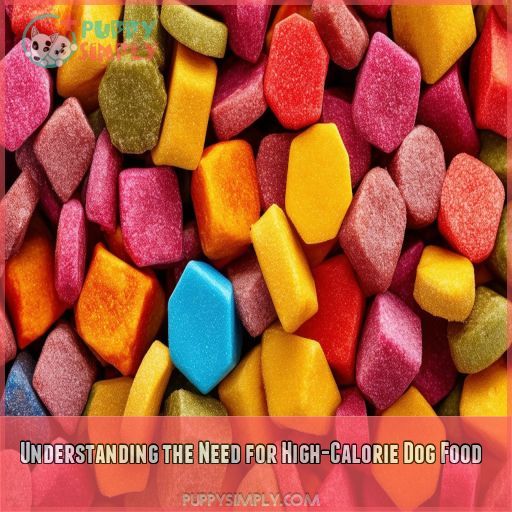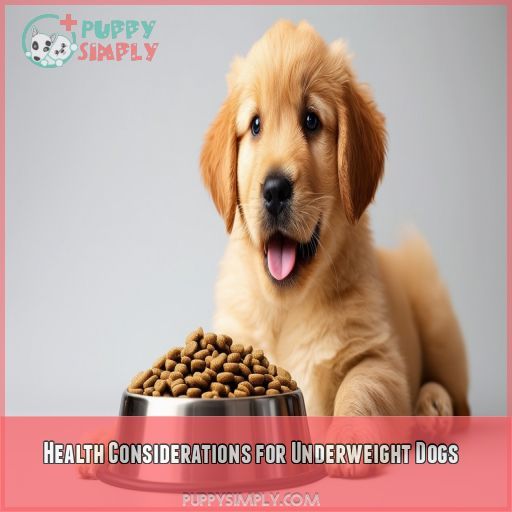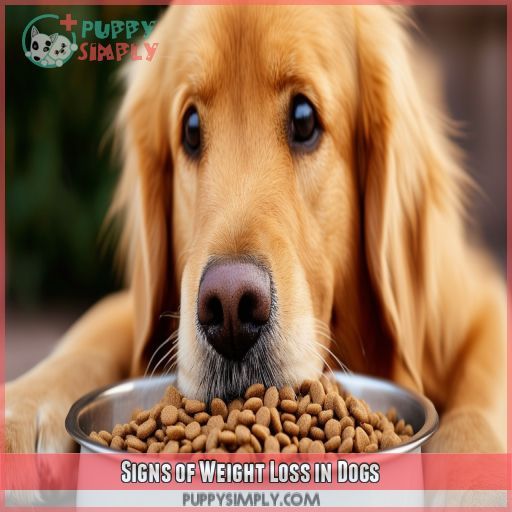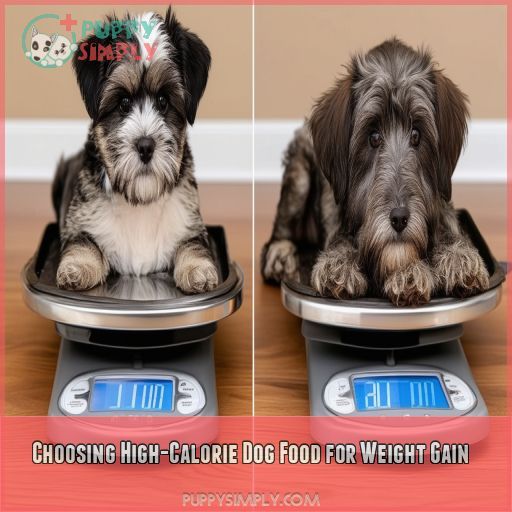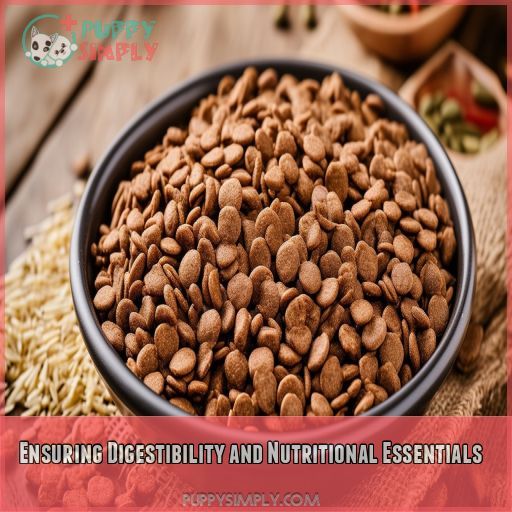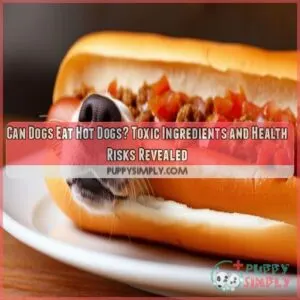This site is supported by our readers. We may earn a commission, at no cost to you, if you purchase through links.
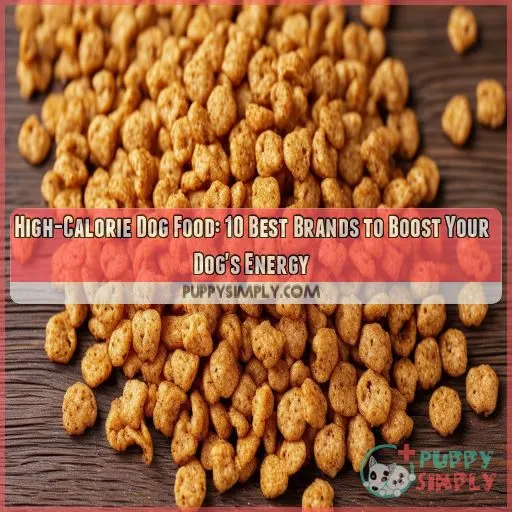 Are you concerned about your dog’s health and energy levels?
Are you concerned about your dog’s health and energy levels?
high-calorie dog food can be the answer to improving your dog’s health and immune system.
In this article, we will explore the top 10 energy-rich dog foods, offer advice on selecting the most suitable option for your furry friend’s unique requirements, and discuss the significance of protein for supporting healthy weight gain.
Table Of Contents
- Key Takeaways
- Top 10 High-Calorie Dog Foods
- 1. Adirondack Puppy Food Natural
- 2. Natures Logic Dog Food Chicken
- 3. Purina Pro Plan High Calorie High Protein Dog Food
- 4. Crave Grain Free Dog Food Chicken
- 5. Merrick Backcountry Grain Free Dry Dog Food
- 6. Natures Logic Chicken Meal Feast
- 7. Pedigree Healthy Weight Dry Dog Food
- 8. Ziwi Peak Air Dried Dog Food
- 9. Earthborn Grain Free Bison Meal Dog Food
- 10. Solid Gold Grain Free Dog Food Beef
- Understanding the Need for High-Calorie Dog Food
- Health Considerations for Underweight Dogs
- Signs of Weight Loss in Dogs
- Choosing High-Calorie Dog Food for Weight Gain
- Ensuring Digestibility and Nutritional Essentials
- Frequently Asked Questions (FAQs)
- What is the best dog food to gain weight?
- What food is high in calories for dogs?
- What can I feed my dog to make her gain weight fast?
- What is the highest calorie dog food per cup?
- How can I increase my dogs calorie intake?
- What are the health risks of an underweight dog?
- Are there any supplements to help my dog gain weight?
- How much exercise does my dog need to gain weight?
- What are the signs of unhealthy weight gain?
- Conclusion
Key Takeaways
- Fuel your furry friend’s adventures with high-calorie dog food – the secret weapon for active dogs and growing puppies.
- Consider their unique needs and choose a food that’s tailored to their tastes and requirements – a perfect fit.
- Protein is the superhero of weight gain, building strong muscles and healthy bodies, ensuring your dog maintains a robust physique.
- Keep a watchful eye on your dog’s waistline, avoiding unnecessary weight gain and potential health issues in the future.
Top 10 High-Calorie Dog Foods
When selecting high-calorie dog foods for boosting your dog’s energy, consider brands like Adirondack Puppy Food Natural and Natures Logic Dog Food Chicken. Other top choices include Purina Pro Plan High Calorie High Protein Dog Food and Crave Grain Free Dog Food Chicken, known for their nutrient-dense formulas.
1. Adirondack Puppy Food Natural
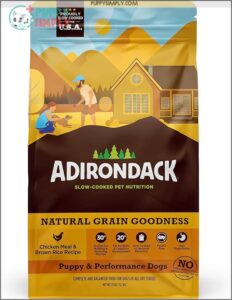
Adirondack Puppy Food Natural is crafted by a family-owned company in the USA, dedicated to nourishing your dog with wholesome goodness. This food is slow-cooked to perfection, maximizing nutrient retention and ensuring your puppy savors every bite. It’s specifically designed for the unique needs of growing puppies and active performance dogs, providing the fuel they need to thrive.
With an impressive 30% protein and 20% fat, this food delivers the essential building blocks for strong muscles and cognitive development. Adirondack is mindful of common allergens, leaving out corn, wheat, soy, and potatoes, so you can rest assured your pup is getting a nutritious meal without any potential tummy troubles.
What sets Adirondack apart is their attention to skin and coat health, with omega 3 and 6 fatty acids sourced from flaxseed and menhaden fish oil, ensuring your pup’s coat shines with vitality. Plus, the addition of pearled barley supports cardiovascular function and improves insulin response, contributing to your dog’s overall well-being.
Best For: Puppies and performance dogs seeking optimal nutrition and health.
- Slow-cooked for maximum nutrient retention
- Provides 30% protein for muscle building and 20% fat for cognitive development
- Supports healthy skin and coat, cardiovascular function, and improved insulin response
- Not specified
- Not specified
- Not specified
2. Natures Logic Dog Food Chicken
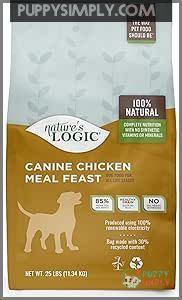
Natures Logic Dog Food Chicken is an exceptional choice for your furry companion.
It’s 100% natural, with 36% protein, most of which comes from premium meat. This food contains zero synthetic vitamins or minerals.
This gluten-free option has GMO-free millet as its sole grain source. It ensures a healthy digestive system with prebiotics and probiotics.
Made in the USA, it contains no ingredients from China, offering peace of mind with no recalls.
However, it may not suit picky puppies or dogs with sensitive stomachs. Some dogs might turn up their noses at the taste.
Best For: Senior dogs seeking a natural and nutritious diet that promotes their well-being.
- 100% natural ingredients with complete nutrition and premium meat sources
- Supports healthy digestion with prebiotics and probiotics
- Sustainable production with renewable electricity and recycled packaging
- May not be suitable for picky puppies or dogs with digestive issues
- Some dogs may not prefer the taste
- Not perfect for all dogs, especially those with sensitive stomachs
3. Purina Pro Plan High Calorie High Protein Dog Food
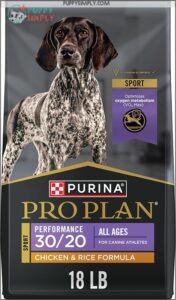
If you’re looking for a high-calorie, high-protein dog food, Purina Pro Plan is a great option.
With real chicken as the first ingredient, this kibble delivers 30% protein and 20% fat to fuel your dog’s metabolic needs and maintain lean muscle.
It is designed for highly active dogs, helping to promote metabolism and build strong, healthy muscles.
This formula also includes:
- Amino acids to nourish muscles.
Best For: Highly active dogs who need extra calories and protein to fuel their metabolism and maintain lean muscle.
- High protein formula (30%) with real chicken as the first ingredient
- Nourishes muscles with amino acids and supports joint health with EPA and glucosamine
- 100% complete and balanced nutrition
- Bag is not resealable
- Pricey
4. Crave Grain Free Dog Food Chicken
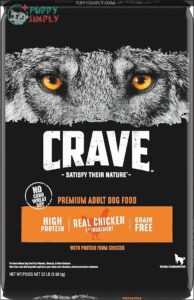
Crave Grain Free Dog Food Chicken is a leading option for pet owners seeking high-calorie dog food.
This recipe boasts quality ingredients that support a strong, lean body and provide ample energy for your four-legged friend.
With 34% protein, it is ideal for all dog breeds and sizes.
The 22-lb bag is grain-free and packed with real, high-quality animal protein, free from artificial flavors, colors, or preservatives.
When transitioning to this food, gradually introduce it by mixing it with your dog’s current food over a six-day period. Ensure your pet always has access to fresh drinking water.
Best For: Dog owners seeking high-calorie, grain-free dog food for all breeds and sizes.
- Grain-free with real, high-quality animal protein
- 34% protein for a strong, lean body and energy
- No artificial flavors, colors, or preservatives
- Not specified
- Not specified
- Not specified
5. Merrick Backcountry Grain Free Dry Dog Food
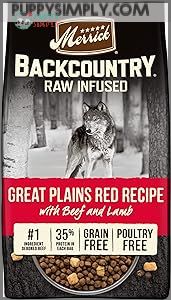
Merrick Backcountry Grain Free Dry Dog Food is a premium option for your furry friend.
Crafted in the USA and founded in Hereford, Texas, this food is a high-protein, wholesome meal for your dog.
The first ingredient is deboned beef, providing a healthy source of protein to maintain your dog’s muscle health and energy levels.
This grain-free recipe also includes a holistic blend of kibble and real freeze-dried raw bites, with added vitamins, minerals, and nutrients. It provides the nutritional benefits of an ancestral diet.
Additionally, it contains high levels of omega-6 and omega-3 fatty acids, supporting your dog’s overall health and coat shine. It also includes glucosamine and chondroitin, which help maintain hip and joint strength.
This natural dog food is poultry-free, gluten-free, and packed with real meat, making it a nutritious and tasty option for picky eaters.
Best For: Picky eaters and dogs with hip and joint issues.
- High-protein with deboned beef as the first ingredient
- Holistic blend of kibble and real freeze-dried raw bites
- Contains glucosamine and chondroitin for hip and joint support
- Not all bags contain the freeze-dried raw pieces
- Some dogs may not enjoy this flavor
- May be more expensive than other dog food options
6. Natures Logic Chicken Meal Feast
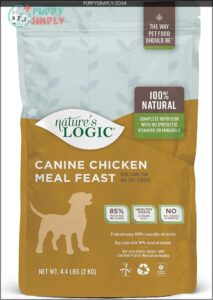
Nature’s Logic Chicken Meal Feast is a high-quality, natural dog food.
It is free of common allergens and synthetic vitamins or minerals.
A complete and balanced meal for all life stages, this food offers a nutrient-dense meat base with select fruits and vegetables.
The formula is coated with probiotics and digestive enzymes, improving nutrient absorption and digestion.
Free of wheat, corn, rice, soy, potato, peas, and lentils, it contains no ingredients from China.
The chicken-flavored meal is a favorite among picky dogs and improves their overall health and happiness.
Best For: Dogs with allergies or sensitive stomachs, and those who prefer a meat-based diet.
- Free of common allergens
- Coated with probiotics and digestive enzymes
- Made with natural ingredients and no synthetic vitamins or minerals
- May be too rich for some dogs
- Can be expensive
- Some dogs may not like the taste
7. Pedigree Healthy Weight Dry Dog Food
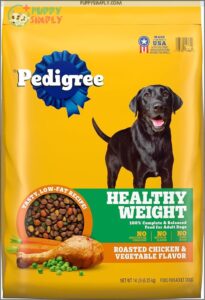
Pedigree Healthy Weight Dry Dog Food is a fantastic option for maintaining your dog’s healthy weight.
It’s low in fat but packed with whole grains, protein, and vegetables, providing your furry friend with a well-rounded and tasty meal.
This food is carefully formulated with 36 vitamins, minerals, and amino acids to ensure your dog receives a complete and balanced diet.
You won’t find any high fructose corn syrup, artificial flavors, or added sugars in this bag. Instead, it contains only wholesome ingredients that support your dog’s overall health and vitality.
With a weight of 0.39 and dimensions of 20.79 x 14 x 3.5, this conveniently sized 14-lb bag is easy to store and will keep your dog nourished and happy.
Best For: Dogs looking to maintain a healthy weight and support overall well-being.
- Low in fat and packed with whole grains, protein, and vegetables
- Formulated with 36 vitamins, minerals, and amino acids for complete nutrition
- No high fructose corn syrup, artificial flavors, or added sugars
- Not suitable for dogs with sensitive stomachs
- May not be appropriate for all breeds and ages
- Transition to this food gradually over 4 days to avoid digestive upset
8. Ziwi Peak Air Dried Dog Food
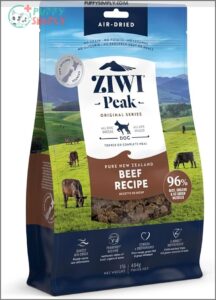
Ziwi Peak Air Dried Dog Food is a high-protein, nutrient-dense option.
It features authentic whole-prey ratios: 96% free-range beef, organs, bone, and New Zealand green mussels.
Preservation
The ingredients are safely air-dried to preserve peak nutrition and a mouth-watering taste.
No Cheap Fillers
This food is grain-free and low-carb. It contains no cheap fillers like grains, potatoes, or peas.
Superfood Boost
Instead, it includes a 10% superfood boost: cold-washed green tripe, New Zealand green mussels, and organic kelp.
Usage
Ziwi Peak can be used as a topper or a complete meal for all life stages.
Ethically Sourced Ingredients
The ingredients are ethically sourced from New Zealand farms and oceans, including free-range, grass-fed, and wild-caught meats.
Hormone-Free
This food is free of added hormones, antibiotics, and growth promotants.
Price
While it may be more expensive, Ziwi Peak offers a high-quality, natural option for your dog’s weight gain journey.
Best For: Dogs at all life stages looking for a high-protein, nutrient-dense food.
- Authentic whole-prey ratios with 96% free-range beef, organs, bone, and New Zealand green mussels
- Grain-free, low carb, and no cheap fillers
- 10% superfood boost with cold-washed green tripe, New Zealand green mussels, and organic kelp
- May be expensive
- May have crumbles and powder in bags
- Some dogs may not enjoy the taste
9. Earthborn Grain Free Bison Meal Dog Food
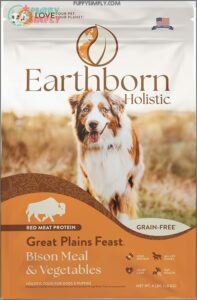
If you’re looking for a high-quality, grain-free food for your small breed dog, Earthborn Grain Free Bison Meal Dog Food is an excellent choice.
Formulated for dogs with grain sensitivities, it provides a balanced and nutritious meal.
This dog food features lean bison and beef meal protein, along with a variety of wholesome vegetables and fruits, ensuring your pup gets all the essential vitamins, minerals, and nutrients they need.
It is also gluten-free and potato-free, making it suitable for dogs with specific dietary requirements.
Remember to introduce this food to your dog’s diet gradually and always adjust feeding amounts based on their weight and activity level.
Best For: Dogs with grain sensitivities and small breeds
- Grain-free and gluten-free
- Contains lean bison and beef meal protein
- Packed with wholesome vegetables and fruits
- Gradual transition to Earthborn Holistic Great Plains Feast is recommended
- Feed 2 to 3 times as much food during gestation and lactation
- Puppies can have free access to solid food from 3 to 4 weeks of age
10. Solid Gold Grain Free Dog Food Beef
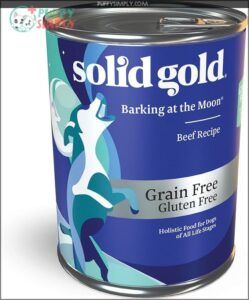
Solid Gold’s Grain-Free Dog Food Beef is an excellent option for a high-calorie diet.
This natural, grain- and gluten-free Wet dog food is made with real, responsibly sourced beef and beef liver.
Product Benefits:
- High in protein and low in fat, providing energy while promoting lean muscle development.
- Balanced omega fatty acids for a soft and shiny coat.
- Superfoods provide natural vitamins, minerals, and antioxidants.
- Free from fillers, artificial colors, preservatives, carrageenan, and BPA.
- Made in the USA.
- 100% satisfaction guarantee.
Precautions:
- May not be suitable for dogs with chicken allergies.
- Some dogs may find the loaf-style form a bit tricky to eat.
Best For: Dogs seeking a high-calorie, nutrient-rich diet without grains or gluten.
- High protein, low fat formula promotes lean muscle development and energy levels.
- Balanced omega fatty acids keep coats soft and shiny.
- Superfoods provide natural vitamins, minerals, and antioxidants.
- May not be suitable for dogs with chicken allergies.
- Loaf-style form can be difficult for some dogs to eat.
- May be more expensive than other dog food brands.
Understanding the Need for High-Calorie Dog Food
High-calorie dog food is essential for providing the energy active dogs need and supporting healthy puppy growth. It also boosts stamina and immunity, ensuring your dog remains vibrant and healthy.
Providing Energy for Active Dogs
Not all dogs are built for a life of leisure. Some are natural athletes, always ready for action and adventure. If you have an active dog, you know the importance of providing them with the fuel they need to keep up with their energetic lifestyle.
High-calorie dog food is an excellent option for active dogs, offering a range of benefits to support their energetic nature:
- Energy Boost: High-calorie food provides the extra energy your dog needs to stay active throughout the day, whether they’re hiking, herding, or just enjoying a game of fetch.
- Lean Muscle Mass: These diets are designed to promote the development and maintenance of lean muscle mass, which is essential for athletic performance and overall health.
- Recovery Diets: After an intense workout or a day of rigorous activity, your dog’s body needs to recover. High-calorie food supports their recovery process, helping them bounce back faster and maintain their active lifestyle.
- Weight Management: For active dogs who struggle to maintain a healthy weight, high-calorie food can be a solution. It helps them gain and maintain weight appropriately, ensuring they’ve the energy reserves needed for their active days.
Supporting Healthy Puppy Growth
As a puppy parent, you want to guarantee your furry friend gets the best start in life.
Proper puppy nutrition is key to supporting their growth and development.
High-calorie, high-protein dog food provides the energy and nutrients needed for healthy puppy growth. It helps puppies gain weight and build strong bodies, ensuring they grow up happy and healthy.
Boosting Stamina and Immunity
High-calorie dog food is essential for boosting your dog’s stamina and immunity, especially if they’re active or working dogs. It’s like giving your furry friend an energy supplement to enhance their endurance training and athletic performance. With the right nutrition, you can support their weight maintenance and overall health, ensuring they’re in tip-top shape for any adventure.
Health Considerations for Underweight Dogs
Taking into account your dog’s health is essential when selecting high-calorie food, particularly if they’re underweight due to malnutrition, gastrointestinal disorders, or metabolic disorders. Chronic diseases and dental problems can also play roles in weight loss, so it’s important to consult your veterinarian for a thorough approach.
Malnutrition
Malnutrition in dogs can have serious health consequences, and it’s important to recognize the signs and take preventative measures. Here’s what you need to know:
Symptoms and Causes:
- Malnutrition can lead to a range of health issues, including weight loss, low energy, and a dull coat.
- It may be caused by an inadequate diet, underlying health conditions, or other factors such as age or psychological issues.
- If your dog is showing signs of malnutrition, it’s important to consult your veterinarian to identify and address the underlying cause.
Prevention and Treatment:
- Prevention is key; make sure your dog has a balanced, nutrient-dense diet with high-quality protein sources and healthy fats.
- For underweight dogs, introduce calorie-dense dog food gradually to avoid digestive issues and promote healthy weight gain.
- Regular exercise is important to build muscle, but monitor your dog’s energy levels and adjust their exercise routine as needed.
Gastrointestinal Disorders
Gastrointestinal disorders can cause your dog to lose weight, and they’re often the result of a poor diet. Symptoms include bloating, diarrhea, vomiting, gas, and constipation.
| Common Ailments | Symptoms | Causes |
|---|---|---|
| Diarrhea | Loose, watery stools | Infections, dietary changes, stress |
| Vomiting | Forceful expulsion of stomach contents | Indigestion, toxins, illness |
| Constipation | Difficulty passing hard, dry stools | Dehydration, low fiber diet, inactivity |
Metabolic Disorders
Metabolic disorders, influenced by genetics, nutritional deficiencies, or gastrointestinal issues, can cause weight loss in dogs. As dogs age, their dietary needs change, so it’s important to be mindful of these shifts.
Dental Problems
Dental problems can also lead to weight loss in dogs. Maintaining healthy dental health and oral hygiene is imperative for your dog’s overall health. Regular teeth cleaning and checkups are essential to prevent dental issues, especially in highly active dogs.
Brands like Victor Classic High Energy and Earthborn Holistic Great Plains Feast offer holistic foods that promote dental care and overall health.
Chronic Diseases
Chronic diseases are a concern for underweight dogs, and these issues can manifest in various ways:
- Chronic fatigue
- Chronic inflammation
- Chronic pain
- Chronic illness
- Chronic stress
Consider high-calorie, high-quality dog foods like Adirondack 30% Protein High-Fat, Kinetic Performance Power 30K, Nature’s Logic Chicken Meal Feast, Bully Max High Performance Super Premium Dog Food, or Purina Pro Plan Sport Dog Food to help your dog maintain a healthy weight and manage these conditions.
Signs of Weight Loss in Dogs
Now that you’re aware of the health risks associated with being underweight, it’s important to recognize the signs of weight loss in dogs.
While it’s normal for dogs to lose weight as they age, sudden or excessive weight loss could indicate a problem.
Keep an eye out for visible ribs, hips, or shoulders protruding through their coat.
Low energy levels, a dull coat, and decreased shine can also be indicators.
Changes in eating habits and depression are other signs that your dog may be losing weight.
Choosing High-Calorie Dog Food for Weight Gain
When choosing a high-calorie dog food to support weight gain, look for formulas that meet specific criteria like high-quality protein sources and digestible carbohydrates. Additionally, introduce any new food gradually and consider weight gain supplements to safely and effectively help your dog reach a healthy weight.
Criteria for a Dog Food for Weight Gain
When choosing a dog food for weight gain, it’s important to look for high-quality, natural ingredients.
Opt for premium animal proteins and moderate-to-high fat content.
Digestible carbohydrate sources are also key.
Nature’s Logic Chicken Meal Feast is a great example of a brand that offers this.
Consider your dog’s ideal serving size. Always consult a veterinarian to ensure healthy weight gain and maximum nutrition.
Safe Weight Gain Tips
When introducing a high-calorie diet for weight gain, ensure the weight gain is gradual to prevent health issues.
Consult a vet to address any underlying causes of weight loss and to determine the appropriate calorie intake for your dog’s activity level.
Gradually introduce new food to avoid digestive issues.
Provide regular exercise to build muscle and monitor weight gain over time, being cautious to ensure it is not excessive.
Weight Gain Supplements
If your dog needs to gain weight, you can try a weight gain formula like MVP K9 Formula Mass, which helps your pup pack on pounds without switching their regular food. Here are some other weight gain supplements to take into account:
- Bully Max High-Calorie Dog Food Topper
- GNC Ultra Mega Healthy Weight Formula
- Vetoquinol Nutri-Cal High-Calorie Dietary Supplement
These supplements provide added calories and vitamins to support healthy weight gain.
Ensuring Digestibility and Nutritional Essentials
To guarantee your dog gains weight healthily, focus on high-quality calories from protein, which are essential for muscle development. Additionally, prioritize digestibility and include balanced fats and complex carbohydrates to support overall health.
Selecting Calories That Come From Protein
When selecting a high-calorie dog food, it’s imperative to bear in mind the quality of protein sources. Choose whole meat or meat meal proteins, which are more biologically appropriate and digestible than by-products or plant-based alternatives. Animal fats, such as those found in wild-caught fish, are also a great source of essential fatty acids and energy.
| Calorie Sources | Protein Quality |
|---|---|
| Animal Fats | Whole Meat or Meat Meals |
| Meat Content | Wild-Caught Fish |
| Grain Inclusion | N/A |
Consider Digestibility
When choosing a high-calorie dog food, it’s not just about the number of calories; the digestibility of those calories matters, too. This is influenced by the quality of ingredients and how well your dog can break them down and absorb the nutrients. Nature’s Logic Chicken Meal Feast, for example, features whole foods and a diverse range of animal proteins that are highly digestible.
Keep in mind that some dogs may have sensitive stomachs or allergies, so introducing new foods gradually and monitoring their digestion is guaranty. You want to guarantee their food isn’t only high in calories but also gentle on their tummy.
Nutritional Essentials for Dogs Aiming for Healthy Weight Gain
For healthy weight gain, your dog’s diet should include adequate caloric density, high-quality protein, balanced fats, complex carbohydrates, vitamins, and minerals.
When choosing a dog food, look for whole meat or meat meal proteins, healthy fats from animal sources, and carbohydrates from whole grains, fruits, or vegetables.
Supplementation with prebiotics, probiotics, and glucosamine can also support your dog’s nutritional needs and overall health.
Frequently Asked Questions (FAQs)
What is the best dog food to gain weight?
Bully Max High Performance Super Premium Dog Food is a high-protein, no-nonsense option. For a high-calorie option, try Elite K9 Maximum Bully. Crave Grain-Free Adult Dry Dog Food is a good value option.
What food is high in calories for dogs?
Wet dog food is a great option for dogs requiring extra hydration, and it comes in various flavours. Dry dog food is less expensive and widely available, but it may contain more fillers. Chicken and rice recipes are popular choices for high-calorie dog food.
What can I feed my dog to make her gain weight fast?
To help your dog gain weight, try high-calorie, high-protein foods like beef, chicken, turkey, fish, and peanut butter. Feed her small meals often, and include sweet potatoes for vitamins and minerals.
What is the highest calorie dog food per cup?
Miracle Vet High-Calorie High Protein Dog Food has 600 calories per cup, the highest of any dog food.
How can I increase my dogs calorie intake?
To increase your dog’s calorie intake, consider high-calorie dog food, supplements, or human food. You can also feed your dog more meals or add extra food to their bowl. Remember to balance calorie intake with exercise to maintain a healthy weight gain.
What are the health risks of an underweight dog?
An underweight dog is like a neglected car—without the right fuel, it won’t run properly. Being underweight can cause serious health issues, from skin and coat problems to a weakened immune system, infections, and even diabetes or heart disease. It’s essential to address this with your vet.
Are there any supplements to help my dog gain weight?
Yes, there are several weight gain supplements for dogs. Options include MVP K9 Formula Mass, Bully Max/Gorilla Max Canine Supplement Combo, Muscle Bully Muscle Builder, and Gorilla Max, Bully Max High-Performance, and K9 of Mine’s Best Overall Dog Supplement for Weight Gain.
How much exercise does my dog need to gain weight?
Aim for 20-60 minutes of daily activity with your dog. For healthy adult dogs, 60 minutes of exercise is a good baseline. Walking is important for physical and mental exercise. Consult your vet before making any major changes to your dog’s routine.
What are the signs of unhealthy weight gain?
Signs of unhealthy weight gain in dogs include joint disease, gastrointestinal issues, and intestinal obstruction. Other symptoms include lethargy, excessive panting, and rapid weight gain.
Conclusion
Alarmingly, 56% of dogs in the United States are overweight or obese. Choosing the right high-calorie dog food is essential for your dog’s health and energy levels.
This article has explored the top 10 energy-rich dog foods and provided essential advice on selecting the best option for your furry friend’s unique needs. We’ve also discussed why protein is key for healthy weight gain and outlined key health issues in underweight dogs.
By following this article’s advice, you can make informed choices about your dog’s diet, taking a proactive approach to their nutritional needs, and ensuring they maintain a healthy weight and have the energy to thrive.
- allpetslife.com
- dogfood.guide
- dogstruggles.com
- puppypointers.com

